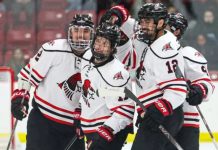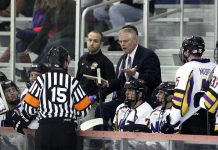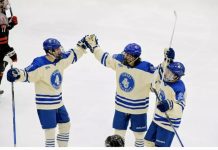A couple of years ago, I received a cartoon in the mail from Bruce Delventhal, the former head coach at RIT and Union College. Now the Treasurer for the American Hockey Coaches Association, for whom I also work, Delventhal is a New York Yankees fan. In the cartoon, a man is walking through a park with a little boy. The man is carrying a baseball bat. The boy is carrying a baseball glove and wearing a baseball cap.
The man says, “Daddy doesn’t hate the Yankees. Daddy has issues with the Yankees.”
As I have mentioned in this space on at least one occasion, I am a Boston Red Sox fan. And, yes, I have issues with the Yankees. My obsession with the Red Sox goes back to childhood, cemented in 1967 when I worked as a vendor at Fenway Park in that glorious summer of Carl Yastrzemski and Jim Lonborg.
On March 31 of this year, my Red Sox opened the 2003 season. My two sons (ages 5 and 6) and I (age 51) donned our replica jerseys and had an indoor picnic in front of the television for the unusual 5:15 p.m. start. Hot dogs and peanuts were on the menu. The boys were fast asleep before the bullpen imploded in the ninth inning, turning a 4-1 lead into a 6-4 loss. Baseball games that count shouldn’t be played in March, I thought at the time.
I’ve come to realize that the degree to which I attach myself to the Red Sox each spring may have something to do with the antithetical behavior I must display each winter. You see, as a conference commissioner I have to be the opposite of a fan for most of the hockey season. As my fellow commissioners know so well, we cannot for a moment be seen smiling, let alone cheering, during any of the league contests which we regularly attend.
We have mastered the art of the non-cheer. Somebody scores, half the rink erupts, and we just sit there. The other team scores, the other half of the building bursts into applause, and we just sit there. Oh, there’s the occasional non-league game and now the Frozen Four, but for the most part, we are robots. If we even silently cheer, it’s for the referees, whom we assign.
Now, lest you think I am exaggerating, I offer Exhibit A from my second year in Hockey East (1999). We had the pleasure of seeing two of our own teams in the NCAA Final that year, a thrilling overtime affair in which Maine downed New Hampshire. Months later, a member of the Maine athletic department staff approached me and said, “Someone told me that after we beat UNH last April, you were heard to say that you felt bad for UNH. Is that true?”
I thought about it for a while and replied, “Yeah, I probably did. They lost the league final in overtime and then the NCAA final in overtime and I’ve known the coach for 30 years.”
The questions continued. “But why would you say that? Why wouldn’t you just be happy for Maine?”
“I was happy for Maine,” I said. “I went into your locker room and congratulated your team. And then I went to the UNH locker room and told them I felt for them.”
Still puzzled, the administrator just walked away.
Hockey fans take their allegiances very seriously. It is an attachment that defies logic and turns otherwise normal human beings into caricatures. Being a fan means not being burdened with objectivity. While I spend much of the winter shaking my head at certain fan behavior, my March 31 experience with the Red Sox was a reminder that none of us are above this. When Carl Crawford’s ninth inning home run completed the Tampa Bay comeback on March 31, there I was, a 51-year old father of three, sitting there in my Red Sox game jersey, and cursing some relief pitcher I had never seen before. In the process, I put myself in the same company as many of the replica-jerseyed fans (RJFs) I had witnessed the previous three days in Worcester and Providence.
Watching most regular season games from press boxes, I don’t sit in the stands that often. I don’t mean for this to come across as my being a snob but, hey, there are few perks with this job. I’ll enjoy the ones I get. During the postseason, however, I tend to use regular tickets. And so, I get to sit in the middle of the aforementioned RJFs.
Here’s what I observed:
• The puck would leave a zone and two players from opposing teams would be tangled behind the play. Instantly, an RJF in a BU jersey across the aisle and six RJFs in UNH jerseys behind me would jump up and scream in unison, “He’s holding ’em! He’s holding ’em!” Unless you were pulling for one of those two schools, there is no way on earth a mortal could look at the two guys tangled up in sticks and arms and legs and tell who was holding whom.
• Players would collide after the whistle. Pushing and shoving would ensue. The referee would blow the whistle and both sets of RJFs, thinking the other team got a penalty, would clap. When “2:00” goes up on the scoreboard twice, reality sets in. Both sets of RJFs start booing. Both sides expected a power play. They are convinced their side got a raw deal.
• “Hey, that’s a hand pass! That’s a hand pass, ref!” I’m thinking, “It was in the defensive zone. It’s legal. Should I tell him? No, I’ll just watch.”
• “It went through the crease! That’s not icing!” Again, I say to myself, “We changed that two years ago. It is icing. I’ll just stay quiet.”
I actually did enter into some good conversation with fans over the three days and six games. But it’s a gamble. Someone asks, “Aren’t you the Hockey East Commissioner?” and you want to smile and say, “Why, yes, I am,” thinking they are going to tell you what a great job you do. Instead, you get a lecture on how bad your league television contract is, why a certain referee should retire, how the league only cares for Boston schools, and why Hockey East is to blame for the ticket prices in Providence.
A fan once told one of our league employees that he knew for a fact that Boston University head coach Jack Parker assigned our referees and actually signed their checks. He believed it. I was told last week that somewhere on the Internet, a fan recently suggested that I personally had it in for Boston University because I lost to them a number of times back when I was in college, some 30 years ago. Last year, during the Hockey East championships, a fan called my wife at the tournament hotel and berated her for the fact that the final game wasn’t televised live. My wife, who was trying to put three children to bed at the time, politely but firmly hung up on the man.
This year, at one of the Regional sites, I assisted the NCAA Committee for one game. This game had teams from two different leagues playing against each other, with an officiating crew from a third conference working the game. None of those three conferences were my own. Yet when the game ended, the losing coach, unable to reach the officials, berated me because he overheard me saying, “Nice game,” to the referees. I half expect that Hockey East or perhaps myself personally will soon be blamed for the perceived ineffectiveness of the military’s “Shock and Awe” campaign in Iraq. It hasn’t happened yet but I haven’t checked my e-mail today.
I went to a game earlier this year and watched Team A defeat Team B by a pretty big margin, 6-1 or 7-1, I think. The shots were 41-9 in favor of Team A. At the end of the game, the coach of Team B was walking across the ice and he started to gesture at the referee, pointing wildly at him. I’m thinking, “You just got outshot by 41-9. You lost by six goals. What in the world could the referee have done to change the outcome of this game and warrant this little tantrum?”
The inability for people with a vested interest in a game or a season to separate fact from fiction reaches a fever pitch during the postseason. They just can’t see straight. As I write this, we are just days from the Frozen Four in Buffalo. This sort of behavior will be everywhere during the season’s final three games. Teams don’t just lose anymore. There is always drama. A sub-plot. The excuses will range from the referees to the condition of the ice to who had to play the late game to the referees to the condition of the team’s hotel to the location of the fans’ seats to the referees.
It reminds me of a story that New Yorker columnist Calvin Trillin likes to tell. Apparently, there once was a guy in New York’s Chinatown who had a trained chicken. This chicken played tic-tac-toe. Patrons would step up and pay a dollar to play the chicken.
As I understand it, the chicken got to go first. And my guess is that the chicken scratched out “X’s” to the patron’s “O’s.” As Mr. Trillin tells it, he took a friend to play the chicken and the chicken prevailed. The friend refused to be embarrassed by the defeat. When asked how he could lose to a chicken, the man said, “Hey, the chicken plays every day.”
It is my sincere hope that when the summer of 2003 starts to wind down, and the heat of August becomes the cool of late September, I can take my Red Sox jersey to the dry cleaners and accept the inevitable. When the bullpen shows its true colors and the bats of those nine first baseman/DH types get heavy, I want to be able to say, it just wasn’t their year.
But, please, someone give me a good slap across the brow, if on the day the Yankees clinch the title, I am heard to mutter anything that even remotely resembles, “Hey, the chicken plays every day!”
In Conclusion
This is my final column of the year and I want to thank USCHO for giving me this opportunity to offer my various ramblings over the past few months. I also want to thank the people, many of you total strangers, who have dropped me an e-mail or offered a comment at one rink or another since this started in the fall.
I imagine I’ll go get a literary agent now and enter into hard negotiations with the USCHO executives for an even more lucrative contract for next year. There will be bitter exchanges in which I try to convince an arbitrator of my unique skills and contributions, while the USCHO heavies will list all my shortcomings and grammatical limitations. In the end, my salary will be doubled and we’ll all shake hands as if nothing ever happened.
Until then, enjoy the Frozen Four and the ever-shrinking “offseason.”


